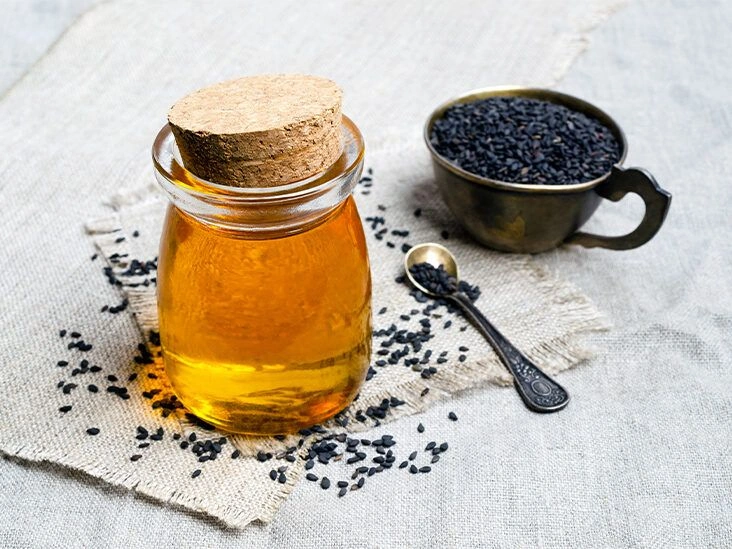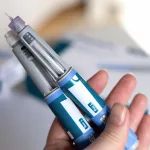Black seed oil may possess anti-inflammatory and antibacterial actions that could be helpful for issues like psoriasis, asthma, hair thinning, and acne. However, additional research is necessary to confirm these possible advantages.
Black seed oil is a botanical extract taken from the small black seeds of the flowering plant Nigella sativa (N. sativa). This plant thrives in warm regions such as Eastern Europe, North Africa, and Southwest Asia.

The seeds have a long history in traditional medicine. Early studies back up some of its therapeutic properties, largely because the seeds are rich in antioxidants and other biologically active constituents.
Other alternate names for the black seeds of N. sativa include black cumin, black caraway, and nigella.
Continue reading to find out more about the possible health benefits of black seed oil.
May improve acne
Some studies indicate that applying black seed oil topically might help skin conditions like acne because of its antimicrobial and anti-inflammatory actions.
A 2020 trial reported that using a topical gel formulated with black seed extract twice daily for 60 days lowered acne severity. Researchers also observed a meaningful decline in the number of acne lesions among participants compared with a control group.
Could assist in psoriasis treatment
Evidence suggests Nigella sativa extract has anti-inflammatory properties, and several studies indicate that black seed oil may lessen skin inflammation and other psoriasis symptoms.
Another study found that using both oral and topical black seed extract reduced psoriasis symptoms and improved skin lesions.
That said, more human trials are needed to draw firmer conclusions.
Supports wound healing
Black seed oil contains thymoquinone, a compound that, when applied to the skin, may reduce inflammation and promote wound repair.
Animal research has shown that thymoquinone may aid in treating burns, excisions, and other wounds because of its anti-inflammatory, antioxidant, and antibacterial effects. The oil appears to boost collagen formation and has moisturizing properties, both of which support healing.
May support hair health and regrowth
Black seed extract is often touted for hair care and is commonly added to products like masks and shampoos.
A 2020 review described a small study in which daily application of a Nigella sativa extract lotion for three months significantly increased hair density and thickness in people with telogen effluvium, a frequent form of hair shedding.
The same review noted a trial of 90 participants comparing different seed oils for hair loss; Nigella sativa oil appeared most effective at reducing hair shedding.
May protect respiratory health and lessen asthma episodes
A 2020 review cited a small study suggesting that inhaled boiled black seed extract might have bronchodilatory effects in people with asthma, improving lung function markers and respiratory rate (helping breathing).
A meta-analysis of four randomized controlled trials also reported that black seed supplements may help control asthma through anti-inflammatory mechanisms.
Further clinical trials are required to confirm black seed oil’s benefits for lung health.
Could help treat vitiligo
Some findings indicate black seed oil may be useful in treating vitiligo, a disorder that leads to loss of skin pigmentation.
A study of 33 people with vitiligo found that applying a cream containing black seed oil twice daily improved pigmentation on the hands, face, and genital area after six months.
Researchers propose that black seed oil’s effect in vitiligo may stem from enhancing melanin dispersion in the skin. Melanin is the natural pigment in hair, skin, and eyes. More work is needed to verify these effects.
Reduces local and systemic inflammation
Studies have demonstrated that black seed oil has notable anti-inflammatory activity. This could benefit many aspects of health, since inflammation is believed to play a role in developing chronic conditions such as type 2 diabetes, cardiovascular disease, and cancer.
May aid weight loss
A 2021 study of 45 women with overweight or obesity showed that taking 2,000 mg of black seed oil daily for eight weeks reduced appetite and led to decreases in BMI, body weight, waist circumference, and body fat.
However, few studies have investigated long-term use of black seed oil, so caution is warranted when consuming large amounts or using it for extended periods.
Improves blood sugar control
Some research indicates that black seed oil may help stabilize blood glucose. A meta-analysis, for example, found that black seed could improve several markers, including insulin and blood sugar levels during fasting and after meals.
»MORE:Living with diabetes? Explore our top resources.Could lower risk factors for metabolic syndrome
Evidence suggests black seed oil may help reduce risk factors associated with metabolic syndrome, a group of conditions that raise the likelihood of heart disease, stroke, and type 2 diabetes.
A trial included 55 participants with hypertension. Half received 2.5 mL of black seed oil twice daily for eight weeks, while the other half took sunflower oil.
By study end, many participants taking black seed oil experienced reductions in:
- diastolic blood pressure
- total cholesterol
- LDL (bad) cholesterol
- fasting blood glucose
Still, it’s important to emphasize that a balanced, whole-food diet and regular physical activity remain the most effective strategies to prevent metabolic syndrome. Supplements like black seed oil may complement a healthy lifestyle.
Dosage information for black seed oil
Black seed oil is available in multiple formats, including shampoos, topical creams, and oral supplements.
Dosages vary based on the intended use. Examples include:
- A 2019 review on black seed and blood sugar noted studies using daily oil doses of 0.7 g, 3 g, and 5 mL.
- A 2021 study reported that 2,000 mg daily supported weight reduction.
- Another trial found taking 2.5 mL of black seed oil daily for eight weeks helped lower blood lipid markers.
Before using any form of black seed oil, consult a healthcare provider to reduce the risk of allergic reactions or other side effects.
Frequently asked questions
Is it safe to take black seed oil every day?
Black seed oil is likely safe when consumed in small amounts, such as culinary use or moderate supplement doses. However, more research is needed about the safety of larger or long-term consumption.
Who should avoid black seed oil?
Consider limiting use of black seed oil if you have functional dyspepsia, liver disease, or kidney disease. As with any supplement, consult a healthcare professional before use—especially if you are pregnant.
Does black seed oil promote hair growth?
Black seed oil is commonly included in shampoos and hair masks because of its antimicrobial and antioxidant qualities that support overall hair health. Some evidence suggests it may help with hair loss related to inflammation or telogen effluvium.
The bottom line
Black seed oil shows promise as a natural option for conditions such as vitiligo, hair loss, psoriasis, metabolic syndrome, and asthma. It may also be helpful for inflammatory disorders and weight management.
Talk with a healthcare professional before starting any supplement or natural therapy, particularly if you take prescription medications. Black seed oil can interact with other supplements and drugs and may not be appropriate for everyone.

























Leave a Reply
You must be logged in to post a comment.